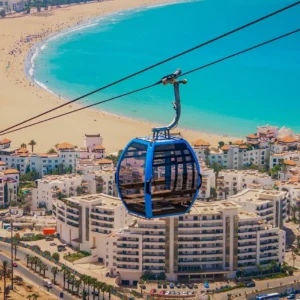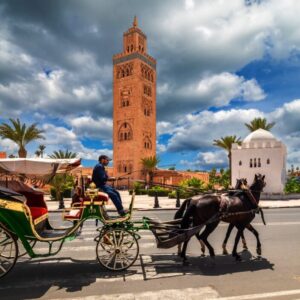Table of Contents
Discover the magic of Morocco’s largest city with our comprehensive travel guide to Casablanca
When planning trips to Casablanca Morocco, many travelers mistakenly view the city as merely a gateway to more “exotic” Moroccan destinations like Marrakech or Fez. However, Casablanca deserves much more than just a passing glance. This vibrant metropolis seamlessly blends historic charm with cosmopolitan energy, offering visitors a unique glimpse into Morocco’s past, present, and future.
As Morocco’s economic capital and largest city, Casablanca (or “Casa” as locals affectionately call it) presents a fascinating contrast to the country’s more traditional imperial cities. Here, Art Deco buildings stand alongside ancient medinas, and traditional souks operate in the shadow of ultramodern shopping malls. Whether you’re drawn by the magnificent Hassan II Mosque, the romantic allure of Rick’s Café, or simply the desire to experience authentic Moroccan culture away from the typical tourist trail, trips to Casablanca, Morocco promise an unforgettable adventure.
This comprehensive guide will walk you through everything you need to know to plan the perfect Casablanca getaway, from when to visit and how to get around to where to stay, what to eat, and which sights shouldn’t be missed.
Why Visit Casablanca? (Beyond the Obvious)
Casablanca might not have the immediate exotic appeal of other Moroccan cities, but its unique character makes it a must-visit destination:
- Architectural Diversity: From stunning Islamic masterpieces like the Hassan II Mosque to elegant French colonial buildings and vibrant Art Deco structures, Casablanca’s architecture tells the story of its multicultural heritage.
- Authentic Moroccan Life: Unlike more tourist-heavy cities, Casablanca offers a genuine glimpse into everyday Moroccan life. Here, you can experience local culture without the touristy veneer.
- Culinary Excellence: Casablanca’s food scene goes beyond traditional Moroccan cuisine, offering world-class restaurants, fusion eateries, and atmospheric cafés where you can sample both local and international dishes.
- Beach Access: The city’s location on the Atlantic coast provides easy access to beautiful beaches, perfect for relaxing after busy days of sightseeing.
- Modern Shopping: From traditional souks to high-end boutiques and contemporary malls, Casablanca is a shopper’s paradise.
Best Time to Visit
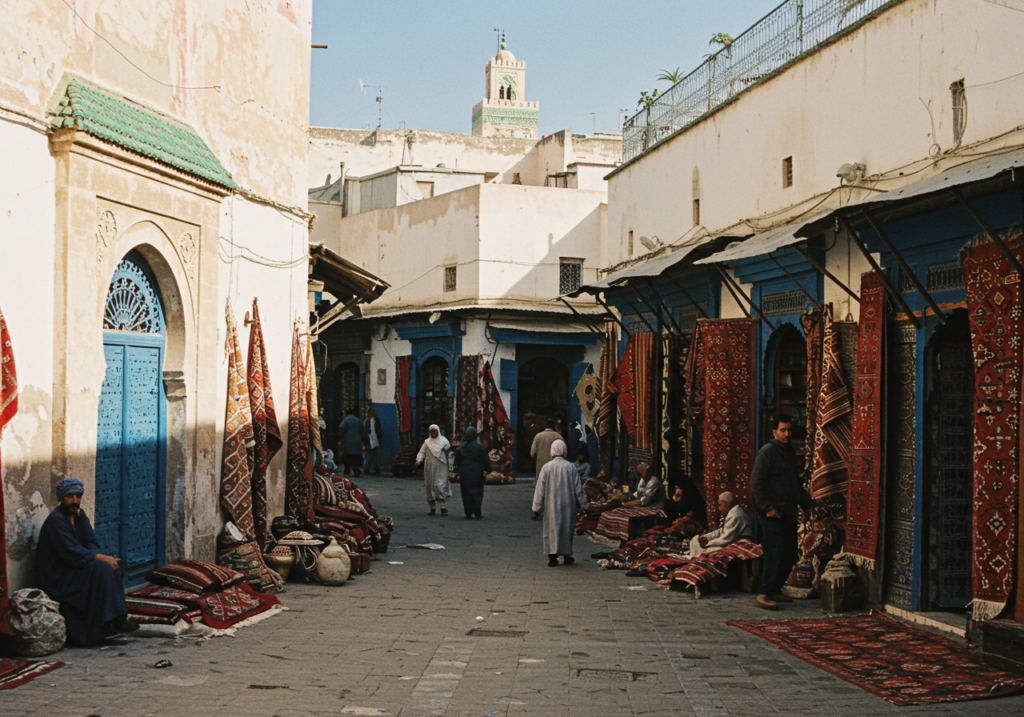
When planning trips to Casablanca, Morocco, timing is everything. The city experiences a Mediterranean climate with distinct seasons:
| Season | Months | Temperature | Considerations |
|---|---|---|---|
| Spring | March-May | 15-22°C (59-72°F) | Mild weather, fewer crowds, occasional rain |
| Summer | June-August | 22-27°C (72-80°F) | Peak tourist season, hot but tempered by ocean breezes |
| Fall | September-November | 16-24°C (61-75°F) | Pleasant weather, fewer tourists, occasional rain |
| Winter | December-February | 8-18°C (46-64°F) | Coolest season, occasional rain, lower hotel rates |
Festival Highlights:
- Casablanca Festival (July): A celebration of music and arts
- Jazzablanca (April/May): International jazz festival
- Ramadan: Dates vary yearly; while many restaurants close during daylight hours, experiencing iftar (breaking of the fast) offers a special cultural insight
Our Recommendation: Spring (April-May) and Fall (September-October) offer the ideal balance of pleasant weather and manageable tourist crowds for trips to Casablanca.
Visa and Entry Requirements
Before embarking on trips to Casablanca, Morocco, check the latest visa requirements:
- Visa-Free Entry: Citizens of many countries including the USA, EU, UK, Canada, Australia, and New Zealand can enter Morocco visa-free for up to 90 days.
- Visa Required: Citizens from many African, Asian, and some South American countries need to apply for a visa before travel.
- Passport Validity: Your passport must be valid for at least six months beyond your planned departure date.
- Entry Form: As of 2023, Morocco may require a health declaration form (check current requirements).
Always verify the latest requirements with the Moroccan consulate or embassy in your country before planning trips to Casablanca, as regulations can change.
Getting There
By Air
Casablanca Mohammed V International Airport (CMN) is Morocco’s busiest airport and a major hub for Royal Air Maroc.
- Direct flights from major cities in Europe, the Middle East, North America, and Africa
- Airlines serving Casablanca: Royal Air Maroc, Air France, Emirates, Qatar Airways, Lufthansa, and others
- Money-saving tip: Booking 2-3 months in advance typically yields the best fares
By Train
If you’re already in Morocco, trains are an excellent way to reach Casablanca:
- From Marrakech: 2.5-3 hours
- From Rabat: 1 hour
- From Tangier: 5 hours via high-speed train
By Bus
Several companies operate comfortable coaches to Casablanca from other Moroccan cities:
- CTM and Supratours offer the most reliable services
- Online booking is available and recommended during peak season
Getting Around Casablanca
Navigating Casablanca is relatively straightforward with various transportation options:
Taxis
- Petit Taxis (small red cars): For travel within the city, use meters or negotiate fare before departure
- Grand Taxis (large white vehicles): For intercity travel, operate on fixed routes with shared seating
Public Transportation
- Tram: Modern, efficient system connecting major areas (7 MAD per journey)
- Buses: Extensive network but can be crowded and routes may be difficult to understand for visitors
Car Rental
- Multiple international agencies available at the airport
- Driving in central Casablanca can be challenging; consider this option mainly for day trips
- International Driving Permit recommended
Ride-Sharing
- Uber and similar services operate in Casablanca, providing a convenient alternative to negotiating with taxis
Local Tip: Download the “Casa Transport” app for real-time information on tram schedules and routes during your trips to Casablanca.
Where to Stay
Casablanca offers accommodations for every budget and preference:
Luxury Options
- Four Seasons Hotel Casablanca: Oceanfront luxury with world-class amenities
- Sofitel Casablanca Tour Blanche: Contemporary elegance in the city center
- Hyatt Regency Casablanca: Premium comfort near the Old Medina
Mid-Range Choices
- Kenzi Tower Hotel: Modern rooms with city views
- Barceló Anfa Casablanca: Stylish property with a rooftop pool
- Hotel & Spa Le Doge: Boutique hotel in an Art Deco building
Budget-Friendly Stays
- Ibis Casa Voyageurs: Clean, reliable accommodations near the train station
- Hotel Majestic: Basic rooms in a central location
- Guesthouses in the Habous Quarter: Local experience at affordable prices
Recommended Areas
- Corniche: Beachfront location with upscale hotels
- City Center/United Nations Square: Convenient for sightseeing
- Gauthier/Maarif: Trendy neighborhoods with boutique accommodations
Things to Do and See
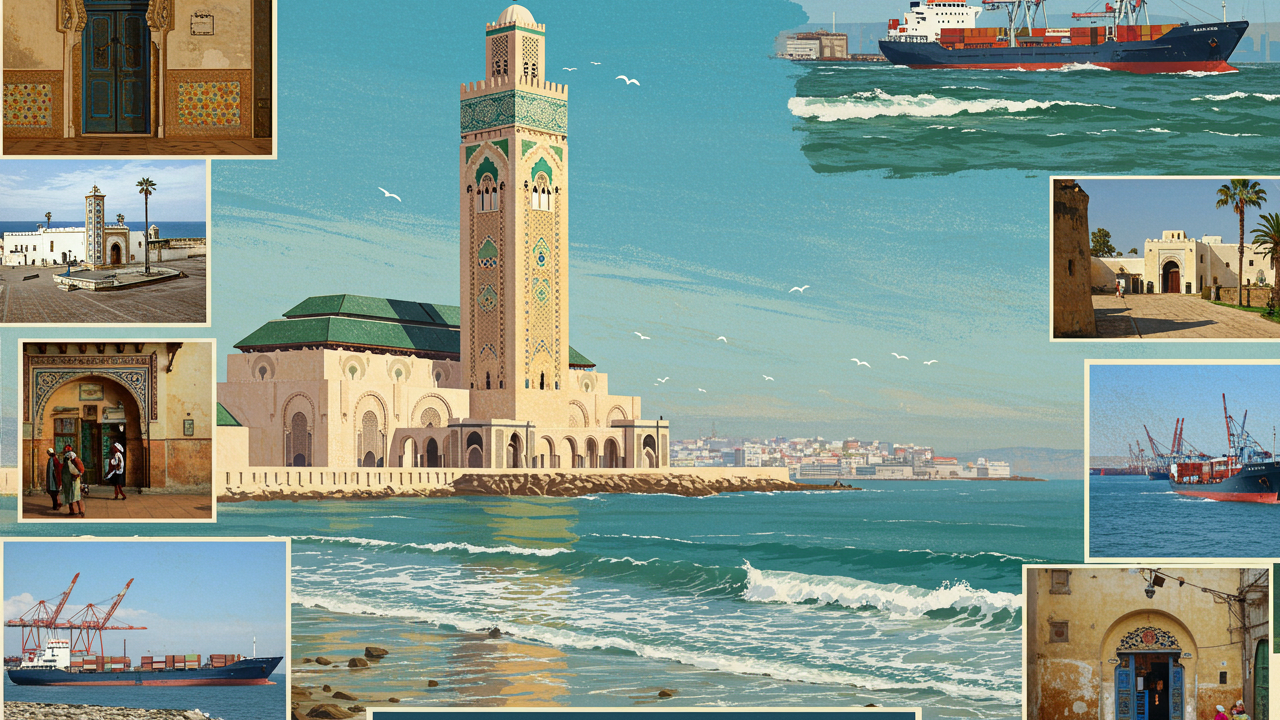
When planning trips to Casablanca, Morocco, include these must-visit attractions:
Hassan II Mosque
This architectural masterpiece features the world’s tallest minaret (210 meters) and is one of the few mosques in Morocco open to non-Muslims. Guided tours available daily except Fridays.
Corniche Ain Diab
Casablanca’s beachfront promenade offers restaurants, beach clubs, and Atlantic Ocean views—perfect for sunset strolls.
Rick’s Café
While not from the original film “Casablanca,” this recreation captures the movie’s ambiance and serves excellent food and cocktails in a nostalgic setting.
Old Medina
Although smaller than those in other Moroccan cities, Casablanca’s Old Medina offers authentic shopping experiences and a glimpse into traditional city life.
New Medina (Habous Quarter)
Built by the French in the 1930s, this planned “traditional” neighborhood provides a more organized souk experience with handicrafts, spices, and olive vendors.
Parc de la Ligue Arabe
Casablanca’s central park offers a green oasis with palm-lined paths—ideal for escaping the urban hustle.
Sacré-Cœur Cathedral
This abandoned church combines Gothic and Art Deco styles and occasionally hosts cultural exhibitions.
Museums
- Moroccan Jewish Museum: Documenting the rich history of Morocco’s Jewish community
- Villa des Arts: Contemporary art in a beautiful Art Deco building
- Museum of Moroccan Judaism: The only Jewish museum in the Arab world
Food and Drink
Casablanca’s culinary scene is a highlight of any visit:
Must-Try Moroccan Dishes
- Tagine: Slow-cooked stews named after the conical clay pot they’re prepared in
- Couscous: Traditionally served on Fridays, featuring steamed semolina with vegetables and meat
- Pastilla: Sweet-savory pie typically made with pigeon or chicken, almonds, and cinnamon
- Harira: Hearty soup especially popular during Ramadan
Recommended Restaurants
High-End:
- Le Riad: Elegant traditional Moroccan cuisine in a beautiful setting
- Basmane: Refined Moroccan dishes with modern presentation
- La Sqala: Located in an old fortress with a gorgeous garden
Mid-Range:
- Al Mounia: Classic Moroccan fare in a traditional setting
- Café M: French-Moroccan fusion with Art Deco ambiance
- La Fibule: Family-run restaurant with authentic local flavors
Budget-Friendly:
- Snack Amine: Delicious street food including shawarma and falafel
- Central Market: Food stalls offering fresh seafood and local specialties
- Patisserie Bennis: Iconic bakery for Moroccan sweets and pastries
Mint Tea Experience
Don’t miss sampling authentic Moroccan mint tea, ceremoniously poured from height to create a frothy top, often accompanied by honey-drenched pastries.
Local Tip: For the freshest seafood, head to the restaurants near the port area where the day’s catch is transformed into delicious dishes.
Safety Tips
Casablanca is generally safe for tourists, but keep these precautions in mind:
- Stay vigilant in crowded areas and tourist spots where pickpocketing can occur
- Avoid displaying expensive jewelry, cameras, or large amounts of cash
- Use registered taxis or ride-sharing services, especially at night
- Keep copies of important documents and leave originals in your hotel safe
- Be respectful when photographing locals; always ask permission
- Stay hydrated, especially during summer months
- Trust your instincts and avoid isolated areas after dark
Cultural Etiquette
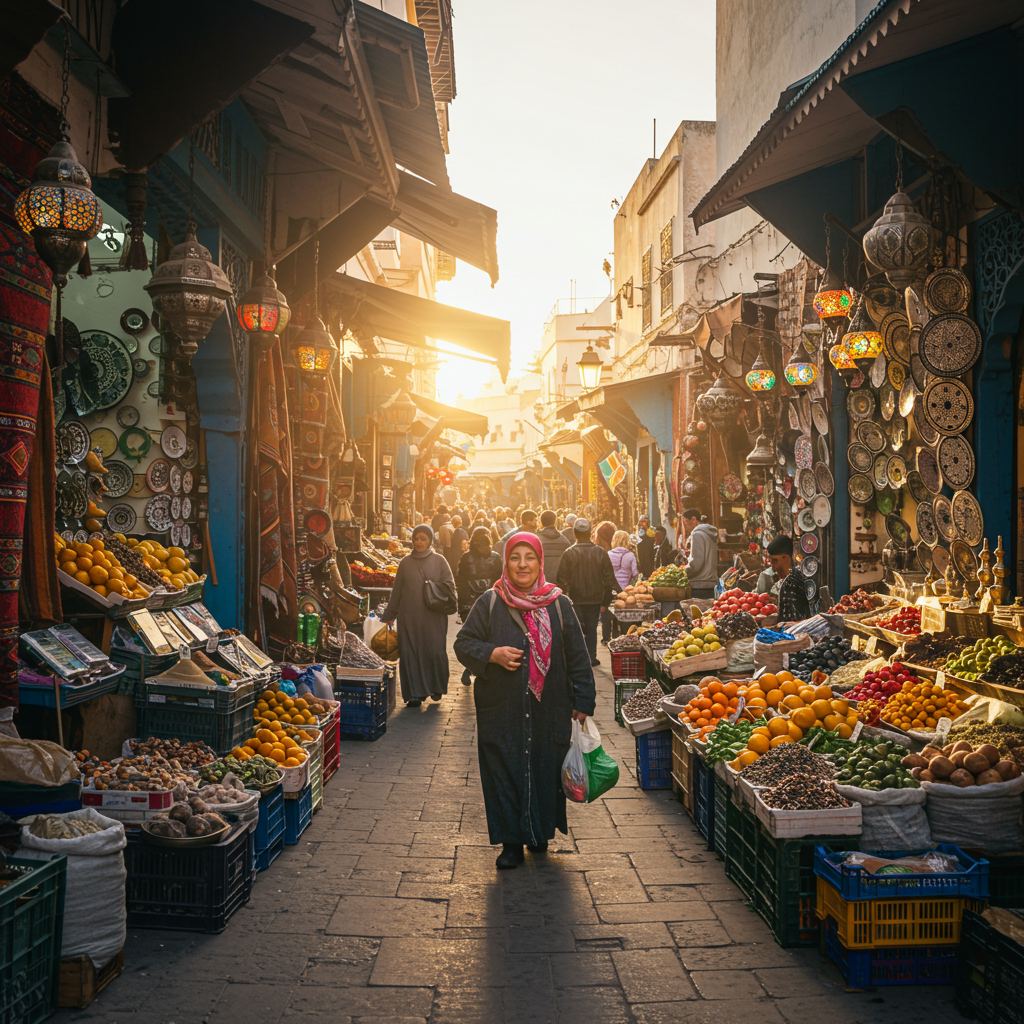
Respect local customs to enhance your trips to Casablanca, Morocco:
- Dress modestly, especially when visiting religious sites (cover shoulders and knees)
- Remove shoes when entering someone’s home or certain areas of religious buildings
- Ask permission before photographing people
- Learn basic Arabic or French phrases (the main languages spoken)
- Eat with your right hand if joining locals for a traditional meal
- Respect Ramadan customs if visiting during this holy month
- Accept offers of mint tea as refusing can be considered impolite
Budgeting
Plan your budget for trips to Casablanca, Morocco with these approximate daily costs:
| Category | Budget | Mid-Range | Luxury |
|---|---|---|---|
| Accommodation | 200-350 MAD | 600-1,000 MAD | 1,500+ MAD |
| Meals | 100-200 MAD | 250-450 MAD | 500+ MAD |
| Transportation | 50-100 MAD | 150-300 MAD | 400+ MAD |
| Activities | 0-150 MAD | 200-400 MAD | 500+ MAD |
| Daily Total | 350-800 MAD | 1,200-2,150 MAD | 2,900+ MAD |
Note: 1 USD ≈ 10 MAD (Moroccan Dirhams) as of 2025
Money-saving tips:
- Visit free attractions like the Corniche and parks
- Eat lunch at local food stalls instead of tourist restaurants
- Use public transportation rather than taxis
- Travel during shoulder season for better accommodation rates
Sample Itinerary: 3 Days in Casablanca
Day 1: Historic Casablanca
- Morning: Visit Hassan II Mosque
- Lunch: Seafood at the port area
- Afternoon: Explore the Old Medina
- Evening: Dinner at Rick’s Café
Day 2: Cultural Immersion
- Morning: New Medina (Habous Quarter)
- Lunch: Traditional Moroccan meal
- Afternoon: Moroccan Jewish Museum and Sacré-Cœur Cathedral
- Evening: Stroll along the Corniche
Day 3: Modern Casablanca
- Morning: Morocco Mall (Africa’s largest shopping center)
- Lunch: Contemporary Moroccan cuisine
- Afternoon: Villa des Arts
- Evening: Dinner and drinks in the Gauthier district
What to Pack
Prepare for your trips to Casablanca, Morocco with these essentials:
- Clothing: Lightweight, modest garments with layers for evening temperature drops
- Comfortable walking shoes for exploring
- Sun protection: Hat, sunglasses, and sunscreen
- Modest attire for visiting religious sites (scarf for women to cover hair)
- Stomach medication and personal prescriptions
- Universal power adapter (Morocco uses Type C/E plugs, 220V)
- Basic French/Arabic phrasebook or language app
- Reusable water bottle to stay hydrated
Practical Information
- Currency: Moroccan Dirham (MAD); ATMs widely available in Casablanca
- Languages: Arabic and French; English spoken in tourist areas
- Electricity: 220V, Type C/E plugs
- Wi-Fi: Available in most hotels, cafés, and restaurants
- Emergency numbers: Police (19), Ambulance (15)
- Time zone: GMT+1 (GMT+0 during Ramadan)
- Tipping: 10% in restaurants; small amounts for other services
FAQ
Is Casablanca safe for tourists?
Yes, Casablanca is generally safe for tourists. Like in any major city, visitors should exercise standard precautions such as avoiding isolated areas at night, keeping valuables secure, and being aware of their surroundings.
How many days do I need in Casablanca?
A minimum of 2-3 days is recommended to see the main attractions in Casablanca. Add additional days if you plan to take day trips to nearby destinations.
What’s the best way to get from Casablanca airport to the city center?
The most convenient options are the train (affordable, runs hourly), pre-arranged hotel transfers, or taxis (negotiate the fare before departing).
Is it necessary to hire a guide in Casablanca?
While not essential, a local guide can enhance your experience by providing cultural context and helping navigate less touristy areas. The Hassan II Mosque requires joining an official guided tour.
Can I drink tap water in Casablanca?
It’s recommended to drink bottled water during your visit to avoid potential stomach issues.
What should women wear when visiting Casablanca?
Women should dress modestly, particularly in more traditional areas. While Casablanca is more cosmopolitan than other Moroccan cities, covering shoulders and knees is advisable, especially when visiting religious sites.
Is Casablanca a good base for exploring other parts of Morocco?
With excellent train and bus connections, Casablanca can serve as a convenient base for day trips to Rabat, El Jadida, and Azemmour. However, for exploring destinations like Marrakech, Fez, or Chefchaouen, it’s better to plan overnight stays.
Do I need to tip in Casablanca?
Tipping around 10% in restaurants is customary. Small tips are also appreciated by taxi drivers, hotel staff, and tour guides.
Conclusion
Trips to Casablanca, Morocco offer a perfect blend of traditional Moroccan culture and modern urban experiences. From the breathtaking Hassan II Mosque to the romantic ambiance of Rick’s Café, from bustling souks to beautiful beaches, Casablanca presents visitors with a diverse array of experiences that go far beyond what most travelers expect.
As Morocco’s economic powerhouse, Casablanca provides a fascinating window into a country balancing its rich heritage with ambitious plans for the future. By venturing beyond the typical tourist trail, you’ll discover a vibrant metropolis where traditional mint tea is served alongside contemporary cuisine, and centuries-old crafts are practiced in the shadow of sleek skyscrapers.
Whether you’re drawn by the architecture, the cuisine, the shopping, or simply the desire to experience authentic Moroccan hospitality, Casablanca welcomes you with open arms and countless opportunities for discovery. Start planning your Casablanca adventure today and prepare to be captivated by this dynamic Moroccan gem.
Ready to Experience the Magic of Casablanca?
Don’t wait to discover one of Morocco’s most exciting destinations! Book your trip to Casablanca now and save up to 30% on premium accommodations when you Book Now.
PLAN YOUR CASABLANCA ADVENTURE NOW →
Join our community of Morocco travel enthusiasts! Subscribe to our newsletter for exclusive travel tips, hidden gem recommendations, and special offers delivered straight to your inbox.

